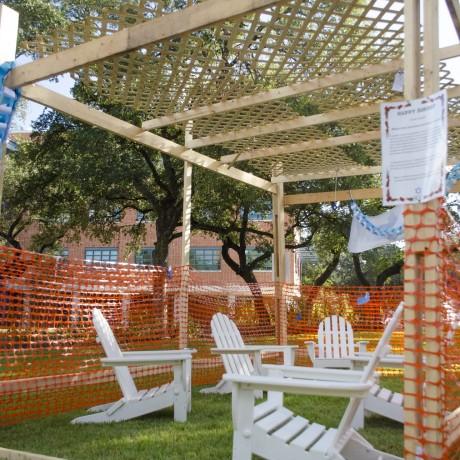
The Jewish holiday Sukkot is celebrated on the 15th day of the month of Tishrei. This year, the holiday lasted from Oct. 8 through Oct. 15 at sunset. During these eight days, Trinity’s Jewish Student Alliance (JSA) built a sukkah””meaning “booth”””on campus to celebrate the holiday.
“During harvest, the Israelites would build these little huts””like what we have at Miller Fountain””so they wouldn’t have to travel all the way back to their homes while they were harvesting,” said David Herman, a junior. “People would often eat meals and hang out with one another in them.”
Many describe Sukkot as the Jewish version of Thanksgiving.
“To me, a sukkah is a family thing, and my favorite memories of Sukkot all involve sitting around a table with my family, eating good food and laughing with each other,” said Natalie Seitzman, a junior.
A sukkah must have three walls, as well as a partially open ceiling so that the stars can be seen at night. Sukkahs are also often decorated with streamers, shiny ornaments, fall foliage and fresh, dried or plastic fruit. The sukkah built this Sukkot is the first on Trinity’s campus in 10 years and shows the importance of the observation of this Jewish holiday.
“It was a student’s mission, David Herman, to have a sukkah on campus. He reached out to the Trinity chaplain, Stephen Nickel, and explained the sukkah’s importance and how much he really wanted to build one on the campus,” said Samantha Mazuz, Hillel advisor for JSA.
Hillel is the largest Jewish campus organization in the world. As Hillel advisor, Mazuz helps create a sense of community for the Jewish students in San Antonio by providing a place where they can celebrate and engage in Jewish traditions. Mazuz also helps to educate students about their heritage and the meaning behind many of the traditions.
“The sukkah definitely stood out on campus, and students showed a lot of interest in asking what it was and why it was there,” Mazuz said. “I think it brought about awareness to the student body that JSA exists and that we are making efforts in making the organization strong, meaningful and a learning experience for its members and the Trinity student body as a whole.”
Herman hopes that the sukkah’s presence will bring more recognition for JSA around campus and encourages the Jewish student population to become more involved in their culture.
“After we built the sukkah and as we were leaving to put stuff back, we saw two people read the sign we put up,” Herman said. “That was really cool to see, especially for us since there really aren’t that many Jews on campus. I really want us to be more known.”
Though the sukkah certainly attracted attention around campus, it also provided a place for many Trinity students to spend time in and be reminded of their heritage.
“On campus, the sukkah provides an opportunity to stop what you’re doing and rest, if only for a moment, and enjoy the day,” Seitzman said.
The sukkah remained on campus for the full eight days of the Jewish holiday and was removed last week. JSA hopes to continue the tradition of having a sukkah on campus in future years.






